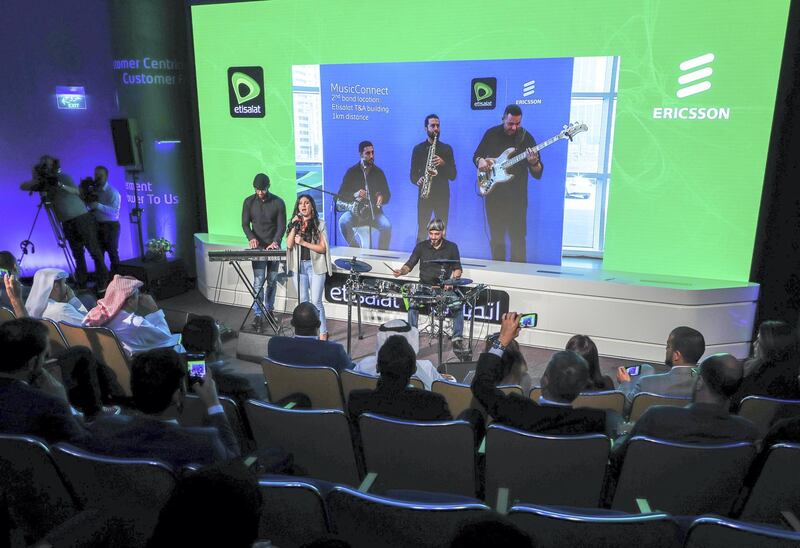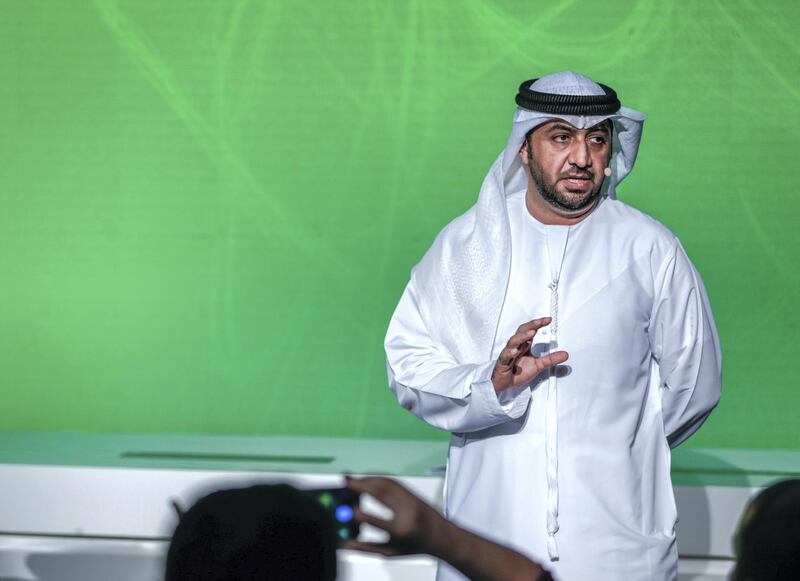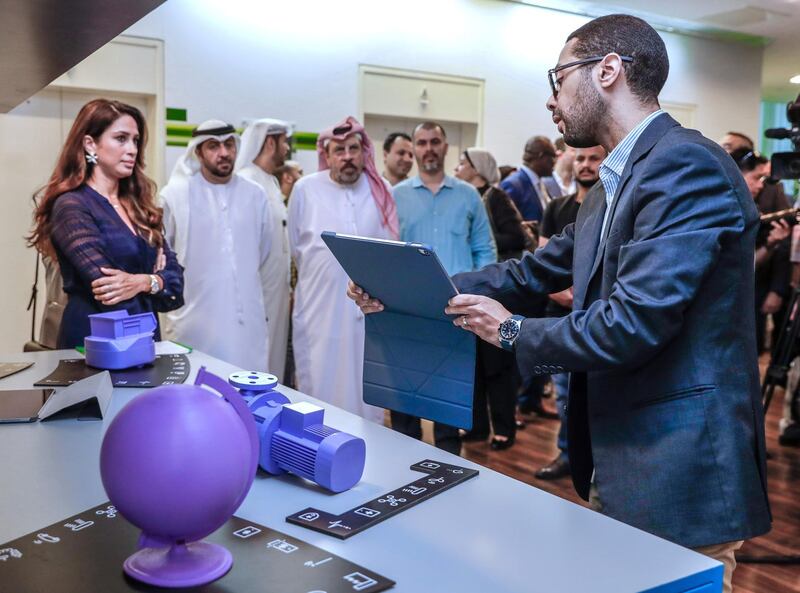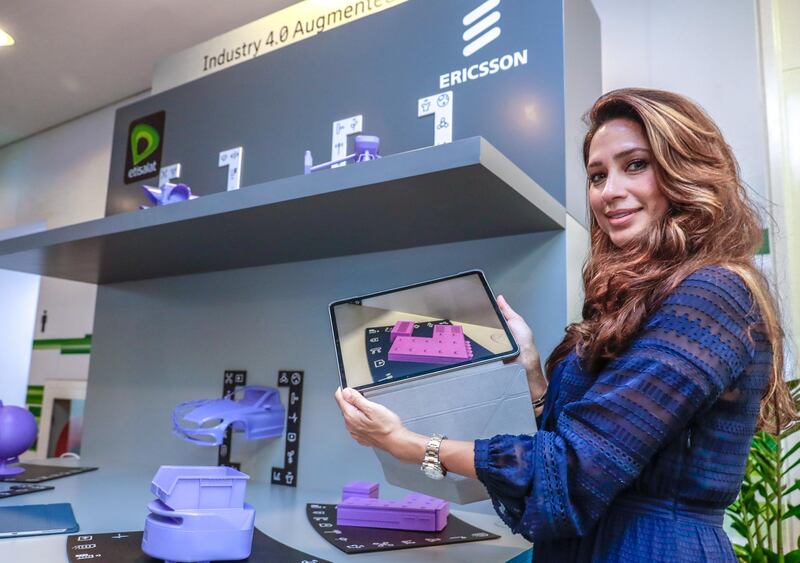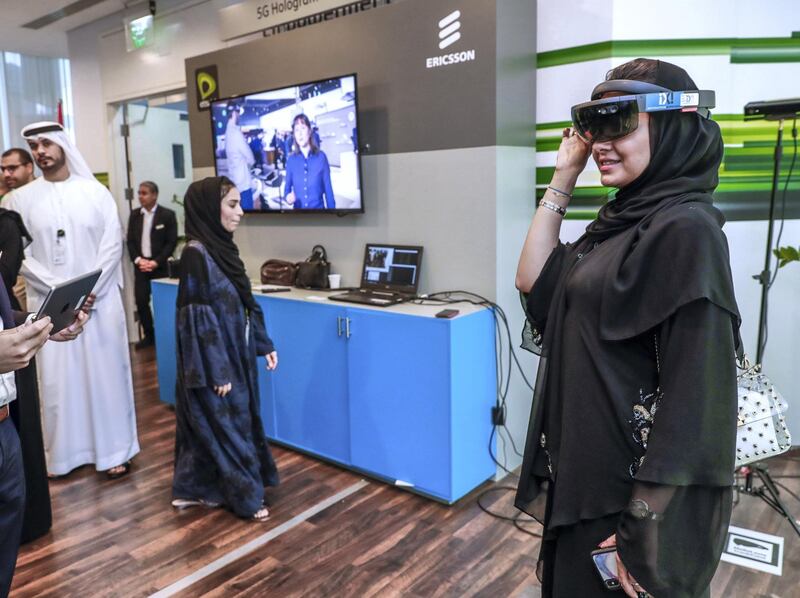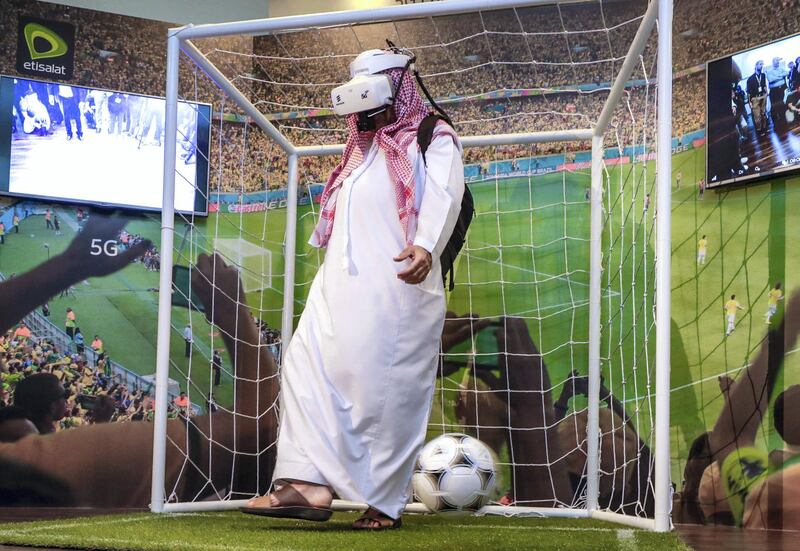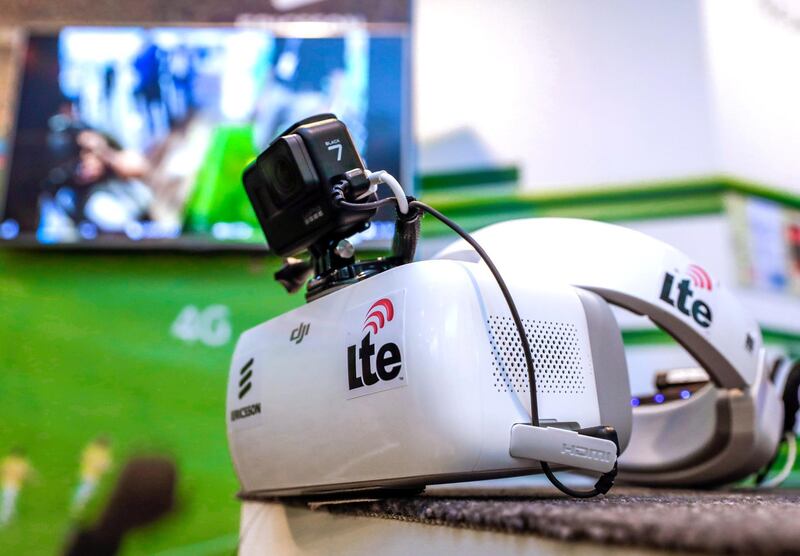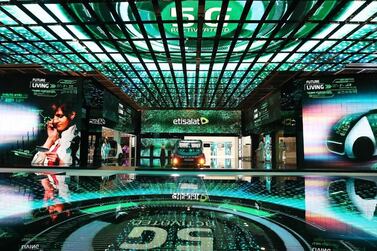It is a Thursday morning at Etisalat’s Abu Dhabi headquarters but rather than business as usual, a perfectly synchronised band is playing music in an auditorium packed with people. The sound is crisp and clear despite the fact that half of the group's musicians are playing from a different building more than a kilometre away, through a live video feed. This is the future. Artists will be able to collaborate remotely and audiences will barely notice.
Streaming delays due to clunky broadband speeds typically make real time remote musical collaboration difficult, if not impossible. So what makes this performance so smooth? The answer is 5G – or fifth-generation wireless networks – deemed to become the backbone of a connected, future-proofed, economically efficient society.
Last year, UAE telecoms operator Etisalat became the first provider in the Middle East and North Africa to launch a commercial 5G mobile network. This is a high-frequency wireless network enabling data capacity of up to 10 gigabits per second, compared to 100 megabits per second for the current 4G - or LTE - network, so 100 times faster than current speeds.
At these speeds, you could download a two-hour film in just 3.6 seconds on 5G, compared to 6 minutes on 4G or 26 hours on 3G, according to the Consumer Technology Association.
Etisalat aims to build 1,000 5G base stations – the infrastructure needed to facilitate the network – across the UAE by the end of 2019, and has set aside Dh4 billion to invest in 5G-related research and development, according to Etisalat spokesman Ahmed Bin Ali.
In May, Etisalat began selling the 5G-enabled ZTE Axon 10 Pro smartphone to post-paid and pre-paid customers. Offering data speeds up to 20 times faster than 4G, the new phone can enable real time video streaming, better gaming experiences and augmented reality on devices.
Earlier this year, Etisalat forged a partnership with Swedish technology giant Ericsson to further explore 5G opportunities. The partnership aims to expand 5G coverage, both mobile and fixed wireless, and market its benefits to UAE businesses and consumers.
For example, those with hearing impairments can receive voice-to-text transcripts on smart glasses using 5G and cloud solutions, the company says, while UAE businesses can explore automation and artificial intelligence to improve productivity and service provision.
At the event, co-hosted by Ericsson, the new network is being put to the test. 5G’s low latency (the level of delay that takes place during communication over a wireless network) enables the musicians to practice and perform in real time, even though they are geographically remote from one another.
After the band finishes playing, assembled media including The National explore a showcase of emerging use cases for 5G, many of which Ericsson presented at the Mobile World Congress show in Barcelona in February. At one stand, a virtual reality football game harnesses the power of 5G latency to enable visitors to instantly react to and kick an incoming ball, whereas using 4G there is a delay, causing them to miss their move.
At another stand, visitors don a HoloLens augmented reality hat to see and converse with a 3D digital representation of a person who is actually standing in an entirely different location. Elsewhere, stands offer immersive experiences using augmented reality applications, such as watching a 360-degree video using virtual reality goggles.
So far, so futuristic. Yet 5G has become a reality far sooner than people predicted, Mr Bin Ali says. And, offering data speeds surpassing 4G networks, 5G represents a fundamental shift in existing internet technology. "5G will catalyse a radical change in telecoms and a breakthrough of the next industrial revolution," he tells The National.
Businesses like Etisalat, as well as governments around the world, are excited because the technological and commercial implications of 5G are huge. Faster download speeds enable wireless networks to support hundreds more connections than is currently possible, so innovations such as driverless cars, which require a constant and reliable stream of real-time data to function safely and effectively, become more viable.
So, too, do the creation of ‘smart cities’ wired up to a central information portal that uses real-time data to monitor events and facilitate efficient public services. If there was a road accident in one part of the city, real-time data flows could be used to control traffic lights and divert cars, enabling paramedics to reach the emergency more quickly.
Ultimately, 5G will help develop the Internet of Things (IoT), the concept of a network of physical objects — drones, buildings, cars, fridges, televisions— embedded with software, sensors and connectivity to collect and exchange data.
This in turn enables companies and consumers to increase efficiencies and drive down costs. At a basic level, IoT-sourced data is already being used to monitor energy consumption and reduce household costs; at its most complex, it can be used to develop sophisticated AI to transform industrial and medical processes.
Today, the majority of cellular IoT devices are connected via 2G and 3G technologies and the number is expected to rise until 2022 when 5G-connected IoT devices start to dominate, said Ericsson’s 2019 Mobility Report published this month. Overall, 5G networks are expected to carry 35 per cent of mobile data traffic globally by 2024, with around 60 million 5G subscriptions forecast in the Middle East and Africa by the end of that year.
Growth of 5G traffic is expected to be more rapid in the Middle East than in many other parts of the world – around eightfold by 2024 compared to five-fold globally, the report added.
This is in large part due to high appetite for video consumption in the region – the Middle East and North Africa has among the highest YouTube penetration rates in the world – as well as the rapid evolution of traditional industries as they seek to maximise efficiencies in a low-oil price environment, as part of economic diversification agendas.
“There are particular opportunities for ports operators and oil and gas firms to enhance productivity by switching to 5G over wifi to operate machinery and gather crucial data,” says Ekow Nelson, Ericsson vice-president and head of the firms’ global customer unit for Etisalat in the Middle East and Pakistan.
Far from being the stuff of science fiction, 5G has arrived - and it could radically alter the digital and economic landscape in the UAE and beyond.
